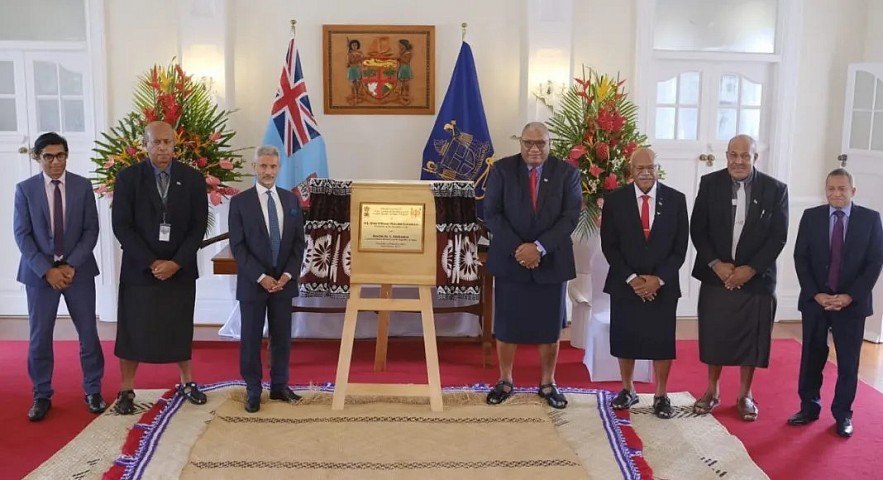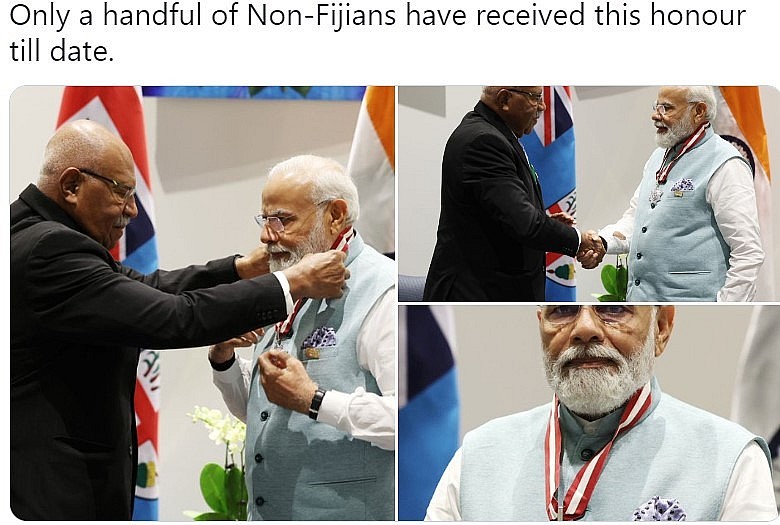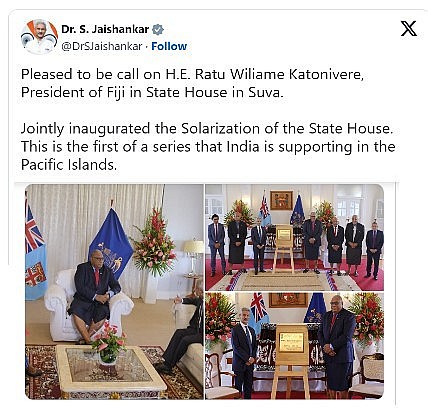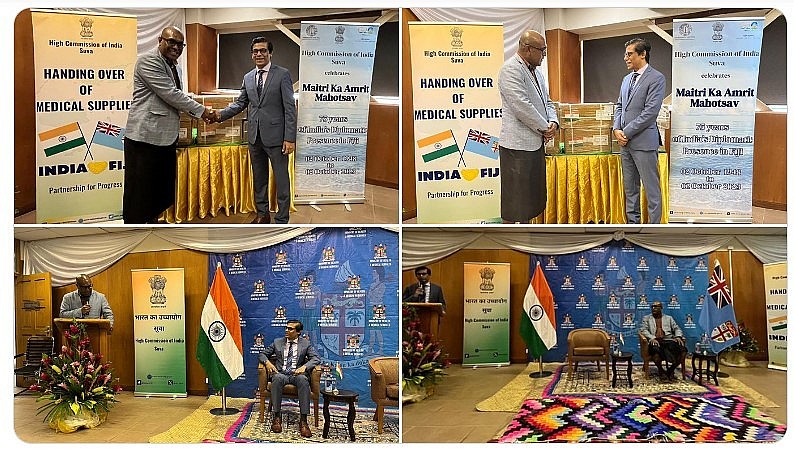FIPIC at 10: India’s strategic engagement with the Pacific Island countries
 |
| Image: India's MEA Dr S Jaishankar call on H.E. Ratu Wiliame Katonivere, President of Fiji in State House in Suva, 2023 (Source: X) |
By Rahul Mishra and Shubhamitra Das
As India celebrates ten years of its ‘Act East Policy’ in 2024 and is poised to enter the second decade of Acting East, FIPIC (Forum for India-Pacific Islands Cooperation), a major initiative taken by the Narendra Modi government in 2014, has also marked a decade since its launch in 2014.
Over the past ten years, India’s engagement with Island countries of the Pacific has widened and deepened albeit not at the same pace as with ASEAN (Association of Southeast Asian Nations) – a regional grouping comprising countries of the Southeast Asian region.
 |
Since 2002, India has been a dialogue partner of the Pacific Islands Forum (PIF), but meaningful engagement only began in 2014 with the Modi government’s establishment of the FIPIC. This initiative has significantly broadened the scope of India’s relationship with the Pacific Island Countries, focusing on trade and investment while also strengthening India’s support for multilateral frameworks and bolstering efforts to address climate change and governance challenges through various forms of development assistance.
In the decade since its inception, FIPIC has hosted three Summits [(Suva (Fiji), Jaipur (India), Port Moresby (PNG)]. The 2023 Summit marked a turning point in bilateral and multilateral cooperation, highlighting the increasing range of collaboration areas, including trade, cybersecurity, medical aid, and infrastructural development. India’s commitment to multilateral diplomacy and ambition to be a reliable partner in the Indo-Pacific region are key drivers of its deepening engagement with the Pacific Islands.
The Indo-Pacific region has become a focal point of India’s foreign policy, given its strategic importance and potential as a mechanism for cooperation. India’s vision of a ‘Free, Open, and Inclusive Indo-Pacific,’ embodied in initiatives such as the IPOI (Indo-Pacific Ocean Initiative) and SAGAR (Security and Growth for All in the Region), underscore the inevitability of regional interdependence. Furthermore, India’s growing strategic partnership with Australia, New Zealand, Fiji, and Papua New Guinea, among others, has complemented its diplomatic and strategic outreach.
Pacific Island Countries: More Important Than Ever for India
Often dismissed as ‘dots on the map,’ the Pacific Islands hold tremendous geopolitical significance due to their vast maritime territories, exclusive economic zones (EEZs), and more importantly their role in the growing voice of the Global South on the climate change front. These Island countries are rich in marine resources and offer immense potential for marine research, innovation, and contributions to global energy and food security. Moreover, the resilience of these islands in the face of climate change and their collective identity as the ‘Blue Pacific’ strengthen their international presence. Despite their status as microstates, the Pacific Islands have emerged as key stakeholders in addressing critical global challenges like climate change.
The geopolitical significance of the region is further amplified by the escalating US-China rivalry. China’s growing influence and military activities in the region have heightened these nations’ vigilance, making the Pacific Island countries a critical theatre for global strategic competition.
The Pacific Islands also serve as a testing ground for international development strategies. Their small economies and scattered geographies make them unique beneficiaries of tailored development projects. These initiatives can be pivotal in creating resilient infrastructures, advancing clean energy technologies, and promoting sustainable fishing practices. Such efforts highlight the importance of regional partnerships that address both local needs and global priorities, reinforcing the strategic significance of the region.
 |
India’s Benign but Potentially Pivotal Role
India’s engagement with the Pacific Islands is multifaceted, encompassing diplomatic, economic, and cultural dimensions. As a leading ‘voice of the Global South,’ India positions itself as a partner that shares common developmental challenges and aspirations with the Pacific Island nations. This shared identity allows India to advocate for these nations on global platforms, particularly on issues like climate change, trade equity, and sustainable development.
India-Pacific Islands cooperation stands on a solid footing, with partnerships in healthcare, education, and renewable energy. India’s support for telemedicine and digital education initiatives has helped bridge gaps in healthcare and education in remote island communities. India’s International Solar Alliance has included Pacific Island nations, enabling them to access affordable solar energy technologies.
While two-way trade volumes remain modest in comparison with Australia or China, there is significant potential for growth in sectors such as agriculture, fisheries, and tourism. India’s investment plans in infrastructure projects, including ports and transportation networks, aim to enhance connectivity and economic integration within the region and may complement initiatives taken by like-minded countries such as Australia.
 |
Towards a More People-Centric Approach
One of the most effective ways for India to deepen its relationship with the Pacific Islands is through people-to-people connectivity. Educational exchanges can play a pivotal role in this regard. Establishing Memorandums of Understanding (MOUs) between the University of South Pacific and Indian universities could facilitate collaborative research and academic exchanges. Such initiatives would not only enrich the knowledge base on the Pacific Islands but also foster cultural understanding and mutual respect. Diaspora connections with Fiji need to be harnessed more systematically for mutual gains.
India could also fund field trips for Indian university students to the Pacific Islands, enabling them to study the region’s unique cultures, histories, and political systems firsthand. These programmes could be complemented by scholarships for Pacific Island students to study in India, creating a network of future leaders with strong ties to both regions.
Civil society cooperation is another avenue for strengthening ties. Joint projects between Indian and Pacific Island civil societies can address shared challenges such as climate change, disaster management, and community development. These collaborations can facilitate the exchange of best practices and build grassroots-level connections that reinforce bilateral and regional partnerships.
Addressing Governance Challenges
Governance is a critical area where India can make valuable contributions to the Pacific Islands. Many Pacific Island nations face challenges related to weak institutions, limited resources, and vulnerability to corruption. India’s experience with decentralized governance at the local community levels, particularly through its Panchayati Raj Institutions (PRI), offers a model that could be adapted to the unique contexts of the Pacific Island countries.
The PRI system, which emphasizes local participation and representation, could empower communities in the Pacific Islands to take ownership of development initiatives. By fostering transparency and accountability through mechanisms like social audits, PRI principles can help ensure the effective implementation of development projects. These efforts can also contribute to achieving the United Nations Sustainable Development Goals (SDGs), particularly in gender equality, poverty reduction, and sustainable resource management.
India’s governance model could be particularly beneficial in Melanesia, which includes some of the region’s largest and most strategically significant countries, such as Papua New Guinea. Fiji and Papua New Guinea occupy key positions in the Indo-Pacific region. Strengthening governance and development in these countries could have ripple effects throughout the region enhancing stability and cooperation.
Strengthening Regional Partnerships
The Quad, a strategic grouping of India, Australia, Japan, and the United States, offers a platform for coordinating efforts in the Pacific region. Through initiatives such as vaccine diplomacy, infrastructure development, and maritime security, the Quad can complement India’s bilateral and multilateral engagements with the Pacific Islands. These partnerships not only enhance India’s strategic presence but also contribute to the overall security and development of the Indo-Pacific region. Having included Southeast Asian students in the Quad fellowship initiative, the same could be extended to the Pacific Island countries as well.
A Vision for the Future
Looking ahead, India must continue to build on the successes of FIPIC while addressing emerging challenges and opportunities. Expanding trade and investment, particularly in sustainable industries, will be crucial in fostering economic growth and resilience in the Pacific Islands. At the same time, India should prioritize capacity-building initiatives that empower local communities and institutions to drive their development. Climate change will remain a central focus of India’s engagement with the Pacific Islands.
Ultimately, India’s engagement with the Pacific Islands represents a unique opportunity to demonstrate its commitment to inclusive and sustainable development. By fostering partnerships based on mutual respect and shared values, India can strengthen its role as a trusted partner of the Pacific Island countries and contribute to a more equitable and prosperous Indo-Pacific.
